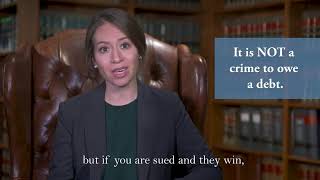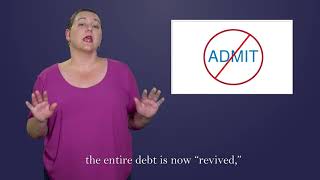Stopping Debt Collection Harassment

Consumer Debt Advice from National Consumer Law Center https://library.nclc.org/stopping-debt-collection-harassment-consumer-debt-advice-nclc
This is the sixth in a series of articles from NCLC that provide advice for families in financial difficulty. Other articles address with medical debt, reverse mortgages, car repossessions, wage and bank account garnishment, and debts owed to the IRS. Click here for a list linking to all the articles in this series.
This article focuses on stopping debt harassment. Do not let debt collectors pressure you. The article explains the limits on what a debt collector can do and sets out eight ways to stop debt harassment—including four sample letters. The article also enumerates illegal debt collection practices and explains how it is practical to hire an attorney to sue the collector for damages.

4:41
Know Your Rights in Debt Collection
Know Your Rights in Debt Collection explains how you can assert yourself when creditors call, and your rights if you are being hounded about a debt.

5:05
Dealing with Debt Collectors
Dealing with Debt Collectors gets into the details about what to expect when a collector calls, and how to respond without losing your cool.
Do Not Let Collectors Pressure You
Do not let debt collection harassment force you into wrong decisions. Make your own choices about which debts to pay first based on what is best for you.
You are not a deadbeat—circumstances outside your control prevent you from paying all your debts. The most common reasons most people cannot pay their bills are job loss, illness, divorce, or other unexpected events. And, creditors and collectors know this. The debt collector’s job is to try to convince you to pay their debt first. Your job, however, is to make the right choices for you and your family.
What Collectors Can Legally Do to Collect on a Debt
Most debts, such as almost all credit card obligations, medical bills, and cell phone charges are “unsecured.” You do not have to put up any collateral such as your home or car to secure repayment. An unsecured creditor collecting a debt that is not owed to the government (for example, tax debts or federal student loans) can only legally do the following four things if you do not pay their debt:
1. Stop doing business with you. A credit card issuer can cancel your card or a dentist might refuse to let you continue as a patient. Usually, even if one merchant stops doing business with you, you can find someone else who will do so, on a cash basis or even on credit.
2. Report the delinquent debt to a credit bureau. The fact that you are behind on your bills will likely end up on your credit record. You cannot stop this, short of always being current on all of your bills. While this is unfortunate, it still may not make sense to prioritize this particular bill first just because that collector is threatening to ruin your credit record.
Many creditors routinely report the status of all of their accounts each month to a credit bureau. When the account is turned over to a collection agency, this also may be indicated on your credit report. By the time a collection agency is threatening you about your credit report, your report may already include the fact that the debt is a number of months delinquent and has been turned over for collection. If that is true, the damage to your credit score has already happened. Paying now will not do much to improve your credit rating and failing to pay will not likely do much more damage to your credit rating. Moreover, if the creditor does not normally report information to a credit bureau, the creditor will not start with you.
3. Contact you to ask you to pay. Creditors will attempt to contact you to arrange for payments on overdue accounts. Your account may then be placed with debt collectors who also attempt to reach you. Traditionally most of these communications have been in writing or by phone, but some collectors now use email, text, or other types of communication. Below you will find several different sample letters that are effective in stopping a debt collector from contacting you if you want to avoid debt harassment. In addition, federal law prohibits third-party debt collectors from telling friends, relatives, employers or other third parties about the debt they claim you owe.
4. File a lawsuit to collect the debt. It is hard to predict whether a particular creditor will actually sue on a past-due debt. How aggressively a collection agency threatens suit is no indication whether the creditor will sue, even if the threat appears to come from an attorney.
If the creditor sues you, you have a right to respond and raise defenses. Doing so may stop the creditor from pursuing the case. However, failing to respond to a lawsuit or failing to show up in court when required may result in a win by default for the creditor.
If the creditor does pursue a lawsuit to its conclusion and the judge rules that you owe the debt, the unsecured debt becomes a court judgment. A court judgment is a higher priority debt than the previous unsecured debt. Post-judgment the creditor may be able to use powerful collection tools such as wage or bank account garnishment (depending on state law).
Eight Ways to Stop Debt Collection Harassment
1. Investigate the collector. You may receive calls from scammers pretending to be debt collectors. Do not make any payments unless you are sure that the collector is legitimate. Investigate whether the person calling you is legitimate by asking for the caller’s name, company, phone number, and business address. Simply asking these questions may discourage a phony debt collector from contacting you again.
Also check to see if your state licenses debt collectors and if the company that is contacting you is licensed. If your state does not license debt collectors, check the registry for a neighboring state. A few states also provide licensing information to the Nationwide Multistate Licensing System at www.nmlsconsumeraccess.org. That website will thus provide a few more states where the debt collector might be licensed.
2. The “stop contact” or “cease” letter. The simplest strategy to stop collection harassment is to write the collector a “stop contact” letter, also called a “cease” letter. Then the collector can only acknowledge the letter and notify you about legal steps the collector may take. This a federal right, however, and only applies to collection agencies hired by the creditor and does not apply to creditors collecting their own debts. But even creditors collecting their own debts will often honor such requests. Below is a sample letter:
- [Your name]
- [Your return address]
- [Date]
- [Debt collector name]
- [Debt collector address]
- Re: [Account number for the debt, if you have it]
- Dear [Debt collector name],
- I am responding to your contact about an alleged debt you are attempting to collect. You contacted me by [phone/mail], on [date]. You identified the alleged debt as [any information they gave you about the debt].
- Please stop all communication with me and with this address about this alleged debt.
- Thank you for your cooperation.
- Sincerely,
- [Your name]
Important: Even if debt collector stops contacting you because of the letter, you will still owe the debt.
Keep a copy of the letter and send the original by mail, return receipt requested. If a debt collector still continues to contact you, send another letter and once again keep a copy. Let them know that you are aware that they are violating the federal law by continuing to contact you. Keep a careful record of any letters and phone calls you receive after sending the letter, which will be helpful if you sue the debt collector.
You do not need a lawyer to send a cease letter. However, if a cease letter does not stop collection calls, a letter from a lawyer usually will. Collection agencies must stop contacting a consumer known to be represented by a lawyer, as long as the lawyer responds to the collection agency’s inquiries. Even though this requirement does not apply to creditors collecting their own debts, these creditors usually honor such requests from a lawyer. A collector’s lawyer is bound by legal ethics not to contact you if you are represented by a lawyer.
3. The “exempt income” letter. If your only sources of income are state or federal government benefits, your income may be “exempt” or protected from collection. If you inform the collector that government benefits are your only source of income, the collector may voluntarily stop contacting you about the alleged debt.
You can inform collectors over the phone if all of your income is exempt, and you can also send a letter like this one:
- [Your name]
- [Your return address]
- [Date]
- [Debt collector name]
- [Debt collector address]
- Re: [Account number for the debt, if you have it]
- Dear [Debt collector name],
- I am responding to your contact about an alleged debt you are attempting to collect. You contacted me by [phone/mail], on [date]. You identified the alleged debt as [any information they gave you about the debt].
- I am living on _______________/month which comes from [name of government benefit(s)]. I believe that all of my income is exempt from collection and creditors may not garnish these payments.
- Sincerely,
- [Your name]
You may want to ask in the letter or a separate letter that the debt collector stop contacting you—see #2, above, for a stop contact or cease letter. Keep a copy of any letters that you send. It is best to send the letter by mail, return receipt requested.
4. The “verification” letter. Often it is not even clear what debt a collector is calling you about, and in that case you should never pay the collector, at least not until you obtain more information. Federal law gives you the right to obtain a verification of a debt from a third-party collector if you send a letter within thirty days of receiving the first written notice from the third-party collector. However, if you have questions, you can still send a verification letter even after the thirty-day period has passed. The collector may still respond.
This sample letter outlines some of the different types of information you might request about the debt—you typically do not need to ask for all this information:
- [Your name]
- [Your return address]
- [Date]
- [Debt collector name]
- [Debt collector address]
- Re: [Account number for the debt, if you have it]
- Dear [Debt collector name]:
- I am responding to your contact about an alleged debt you are trying to collect. You contacted me by [phone/mail], on [date] and identified the alleged debt as [any information they gave you about the debt].
- Please supply the information below so that I can be fully informed about the alleged debt:
- Why you think I owe the debt and to whom I owe it, including:
- The name and address of the creditor to whom the alleged debt is currently owed.
- The name and address of the original creditor and any other names used.
- A copy of the original contract or other agreement.
- The name of any other person that is or was required to pay the alleged debt.
- The amount and age of the debt, including:
- Provide a copy of the last billing statement sent to me by the original creditor.
- State the amount of the alleged debt when you obtained it.
- State the date when you obtained the alleged debt.
- Provide an itemized list of any alleged interest, fees, or charges since the last billing statement from the original creditor.
- Provide a copy of any agreement expressly authorizing such interest, fees, or additional charges.
- Provide an itemization showing any payments since the last billing statement from the original creditor.
- State when the creditor claims this debt became due and when it became delinquent.
- Identify the date of the last payment made on this account.
- State when you think the statute of limitations expires for this debt, and how you determined that.
- Details about your authority to collect this debt, including:
- Provide the number of any license to collect debt in [insert name of the state where you live] and the name of the issuing agency.
- Provide the number of any license to collect debt in the state where you are located and the name of the issuing agency.
- Please treat this debt as disputed until you provide the information requested.
- Thank you for your cooperation.
- Sincerely,
- [Your name]
Keep a copy of any letters that you send. It is best to send the letter by mail, return receipt requested.
5. The “dispute” letter. If you do not think the debt is yours, you should send the collector a dispute letter. Collectors make a lot of mistakes, and disputing the debt may resolve the matter. The letter also stops collection contacts until they send you more information verifying the debt. Here is a sample letter.
- [Your name]
- [Your return address]
- [Date]
- [Debt collector name]
- [Debt collector address]
- Re: [Account number for the debt, if you have it]
- Dear [Debt collector name],
- I am responding to your contact about collecting an alleged debt. You contacted me by [phone/mail], on [date] and identified the alleged debt as [any information they gave you about the debt]. I do not have any responsibility for the debt you’re trying to collect.
- Record that I dispute having any obligation for this debt. If you stop your collection of this debt, and forward or return it to another company, please indicate to them that it is disputed. If you report it to a credit bureau (or have already done so), also report that the debt is disputed.
- Thank you for your cooperation.
- Sincerely,
- [Your name]
Keep a copy of any letters that you send. It is best to send the letter by mail, return receipt requested.
You may want to ask the debt collector to stop contacting you in the same letter. Alternatively, you may wish to combine a dispute with a request for verification of certain information. See #2 and #4, above.
6. Negotiating work-out agreements. Too often consumers respond to debt harassment by agreeing to make payments to the collector. You should not pay even a little on a credit card, medical, or other unsecured debt if doing so means that you become delinquent on high priority debts like your rent or payments for a car that you need to get to work or have insufficient resources for essential family expenses like food.
Be wary of making a partial payment on old debts. You cannot be sued on a debt that is a certain number of years old (depending on your state). If you make even a small payment on an old bill, courts may treat this as starting the time period over again, and you can then be sued on the debt only because you made that payment.
Beware of debt settlement companies that promise to negotiate with the creditor on your behalf. These companies typically take large fees and often produce far less than promised. If you do decide to negotiate a payment plan for a reduced amount of the debt, you may get a better deal if you try to work with the creditor and not the debt collector.
Drive a hard bargain on any payment plan you agree to—ask them to reduce the debt. Be careful not to agree to pay more than you can afford. If you’re uncomfortable negotiating on your own, ask a social worker, trusted friend, or relative to help you. Get any deal in writing. Also negotiate to get the creditor to help you with your credit report.
Determine if you are judgment-proof. Being judgment proof means that if the creditor sues you, that creditor will not be able to seize your income or property because they are all exempt under your state law. If you are judgment-proof, offer the creditor little or nothing and just say that it is not worth pursuing you since you are judgment-proof. Also tell them to stop contacting you. See letters at items #2 and #3, above.
7. Complaining to the Consumer Financial Protection Bureau. Send a complaint about a debt collector to the Consumer Financial Protection Bureau at www.consumerfinance.gov/complaint. The agency will forward your complaint to the debt collector and work to get you a response, usually within fifteen days. You can also complain to the consumer protection division of your state attorney general’s office. Some states offer mediation services for consumer disputes.
8. Bankruptcy. Filing your initial papers for personal bankruptcy instantly triggers the “automatic stay” that stops all collection activity against you. As a rule, a bankruptcy filing does not make sense where your only concern is debt harassment since you can stop the harassment with a cease contact letter (see #2, above). Save the bankruptcy option for when you have serious financial problems. For this reason, be wary of an attorney offering to file bankruptcy for you if the only problem is debt harassment.
Illegal Debt Collection Conduct
The major law dealing with illegal debt collection conduct is the federal Fair Debt Collection Practices Act (known as the FDCPA). The FDCPA only applies to debt collectors (including collection attorneys), but state law may have similar requirements for the creditor’s own collection efforts.
The FDCPA requires collection agencies to take certain actions, including:
- The collection agency must stop contacting you if you make a request in writing.
- The collection agency, in its initial communication or within five days, must send you a written notice identifying important information about the debt. If you raise a dispute in writing within thirty days of receiving that notice, the collector must suspend collection efforts on the disputed portion of the debt until the collector responds to the request.
The FDCPA also prohibits collection actions from engaging in harassing conduct, including:
- Communicating about a debt without your permission with your relatives, employers, friends, neighbors, or others. Collectors may contact attorneys, credit bureaus, cosigners, and your spouse. They can contact others only to locate you and cannot reveal that a debt is involved.
- Using any communication, language, or symbols on envelopes or postcards that indicate that the sender is in the debt collection business.
- Communicating with you at unusual or inconvenient times or places. The times 8:00 a.m. to 9:00 p.m. (in the time zone where you live) are generally considered convenient, but daytime contacts with a consumer known to work a night shift may be inconvenient.
- Contacting you at work if the collector should know that your employer prohibits personal calls.
- Contacting you if you are represented by a lawyer.
- Using obscene words, racial slurs, insulting remarks, or threats of violence.
- Telephoning repeatedly with intent to annoy, abuse, or harass.
- Falsely representing the character, amount, or legal status of a debt.
- Falsely stating or implying a lawyer’s involvement.
- Stating that nonpayment will result in arrest, garnishment, or seizure of property or wages, unless such actions are lawful, and unless the collector fully intends to take such action.
- Failing to disclose in communications that the collector is attempting to collect a debt.
- Collecting fees or charges the collector is not entitled to collect.
- Depositing post-dated checks before their date.
- Creating the false impression that the collector is an affiliate or agent of the government.
Finding an Attorney to Sue a Debt Collector. You can sue debt collectors that violate your rights under federal law. If you win a lawsuit under the FDCPA, you can recover money for any injuries, up to $1000 in additional damages, and attorney fees.
The National Association of Consumer Advocates (NACA) is a good resource to help you find an attorney to take your case to sue a debt collector for illegal debt collection conduct. Members by state and specialty are listed at www.consumeradvocates.org/find-an-attorney. Families with low incomes and limited assets may be eligible to obtain free legal services from a neighborhood legal services office. You can find legal aid programs at www.lawhelp.org/find-help. Other consumers can contact local bar associations for attorney referrals.
What You Should Tell Your Attorney. Once you find an attorney, tell him or her how the collector’s misconduct affected you and your family. Overcome any reluctance to discuss your feelings about the harassment, since the details will be critical in determining what kind of legal case you have. All symptoms of emotional distress should be discussed, including: anxiety, embarrassment, headaches, nausea, indignation, irritability, loss of sleep, and interference with family or work relationships. Did you consult a doctor? Were there illnesses brought on by the harassment?
Share information about out-of-pocket losses with your attorney, from loss of employment to loss of wages because of time taken off from work to try to resolve the dispute. In addition, telephone charges, transportation, medical bills, and counseling services could all be part of your actual damages. Keep a record of all expenses related to the collection effort.
Make a log of all collection contacts with as many details as possible for each contact: time, date, company, caller, and what was said. Abusive voicemail messages should not be erased, if at all possible.



